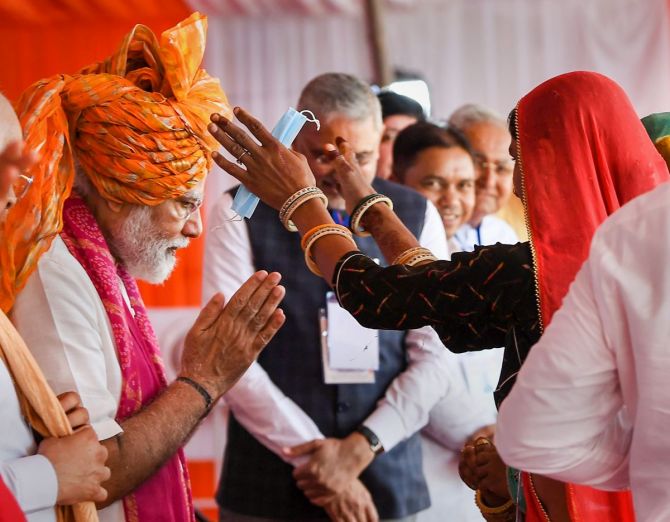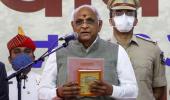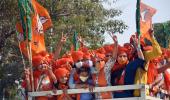'The BJP's problem is what rabbit can it pull out of the conjurer's hat?'

In just one week, the Bharatiya Janata Party government in Gujarat reneged on two significant decisions: Linking the Tapi, Par and Narmada rivers, and withdrawing the Gujarat Cattle Control (Keeping and Moving) in Urban Areas Bill, 2022.
The moves would have impacted the lives and interests of important electoral constituents the BJP nurtured and nourished in the decades it ruled Gujarat -- the Adivasis and the pastoral, quasi-nomadic Maldharis.
On March 29, the Bhupendra Patel government announced it would suspend the river linking project, following a late-night meeting in Delhi on March 29 among central ministers Amit Anilchandra Shah, Nirmala Sitharaman and Gajendra Singh Shekhawat, and C R Paatil, the Gujarat BJP president, who is the point person between the Centre and the state.
The suspension ensued after large-scale protests by the Adivasis in the Narmada district threatened to jeopardise the BJP's rock-solid base among the community in south Gujarat that saved the party from a near-defeat in the 2017 assembly elections.
When Sukhram Rathva, the Opposition leader in the legislature, and the Congress's Navsari legislator Anant Patel, who spearheaded the protests, articulated their dissent vocally, the government retraced its steps.
Rathva, an Adivasi leader, warned that if the rivers were linked as many as 50,000 Adivasi homes would be submerged and hundreds of thousands would be displaced.
The Congress was initially unwilling to hear Rathva and Anant Patel, but gave in when it saw they would not budge.
Two days later, C R Paatil declared that the cattle control Bill would be revisited.
It was intended to keep stray cattle out of bounds in cities and towns, and laid down stringent pre-conditions for cattle breeders.
It was mandatory for cattle owners to procure a municipal licence and tag the animals, failing which offenders would have to pay a huge fine and serve a jail sentence.
The Maldharis -- a community of cattle farmers living largely in Kutch and Saurashtra and classified variously as scheduled tribe, scheduled caste or backward caste (depending on their place of habitation) in Gujarat's jumbled caste categorisation -- were displeased.
They were BJP votaries ever since the government channelled Narmada water to their homes and fields and augmented their earnings.
In 2017, when the Gujarat assembly tweaked the cow protection law to give life sentences to lawbreakers, the Maldharis feted the BJP by performing 'puja'.
The Maldharis are no longer confined to villages. Increasing urbanisation brought them to the cities but they refused to give up cattle rearing.
The BJP was already hurt by the resignation of a Maldhari leader, Bhima Rabari and his workers, in July 2021 for not giving the Dalit sections of the community Adivasi status.
"We won six elections serially, so there is bound to be anti-incumbency. It was strong in 2017. We don't yet have a measure of the degree this time," admitted a BJP office-bearer off the record.
Yamal Vyas, the BJP's chief spokesperson in Gandhinagar, claimed: "Things are not bad. Our government's performance after the second phase of COVID-19 has been good. The economy is picking up. Doubtless, unemployment is a challenge, but that's all over India."
The editor of a prominent Gujarati newpaper, who didn't wish to be named, said: "Anti-incumbency and a rural-urban divide like in 2017 persist. A generation of new voters may look for an option. The BJP's problem is what rabbit can it pull out of the conjurer's hat?"
"Apart from the Maldharis, doctors and teachers are agitating because the government hasn't delivered on its promises," he added. "The BJP is up against a Rustom-Sohrab situation, infighting between the old guard and a younger line-up. The sulking veterans won't actively damage, but they won't campaign either."
However, like in most states, the BJP keeps winning -- its organisation is the strongest asset.
Ratnakarji, the state BJP's general secretary (organisation), said: "A new element is we will have two active workers (defined as those enlisting 100 dedicated members) and a five-member team in each of the 52,000 polling booths. They are updating the voter lists and hope to complete the task by June."
"Our ministers and MLAs have to spend three days in each assembly constituency to understand people's problems and try to resolve them," Ratnakarji added.
In the 2017 polls, the BJP suffered reverses in North Gujarat and Saurashtra against the backdrop of the Patidar (Patel) agitation for reservation.
"This time, we are confident of getting Patel votes," stressed Ratnakarji.
However, eight months before the elections, Gujarat is beset by a conflict between two Patel sects -- the Leuva and Kadva Patels -- for political sweepstakes.
Naresh Patel, an industrialist and chairman of the Leuva Patels' Khodaidham Temple Trust, was courted by the BJP and the Congress.
Patel came from a family of Congress supporters and, therefore, the Congress believes he will join the party.
"As yet there's no clarity," conceded a Congress source.
The CM is a Kadva Patel which is why the BJP is convinced it will swing the votes of the sect.
An added advantage in bringing Naresh Patel is that Raju Solanki, who heads the Madhanta Trust, a community organisation of the backward caste Kolis, is an ally of his.
The Kolis, divided into several sub-castes, constitute 24 per cent of the population and are spread across Saurashtra and central Gujarat.
Veteran Congressman Arjun Modhwadia projected a mixed picture of his party's prospects.
"There's no communal polarisation. The BJP must account for corruption and its law-and-order mismanagement. Although Gujarat never had a place for a third force, the Aam Aadmi Party could cut our votes to an extent."
Manish Doshi, Congress spokesperson, said: "Everything depends on our campaign and how effectively we expose the BJP's lies."











